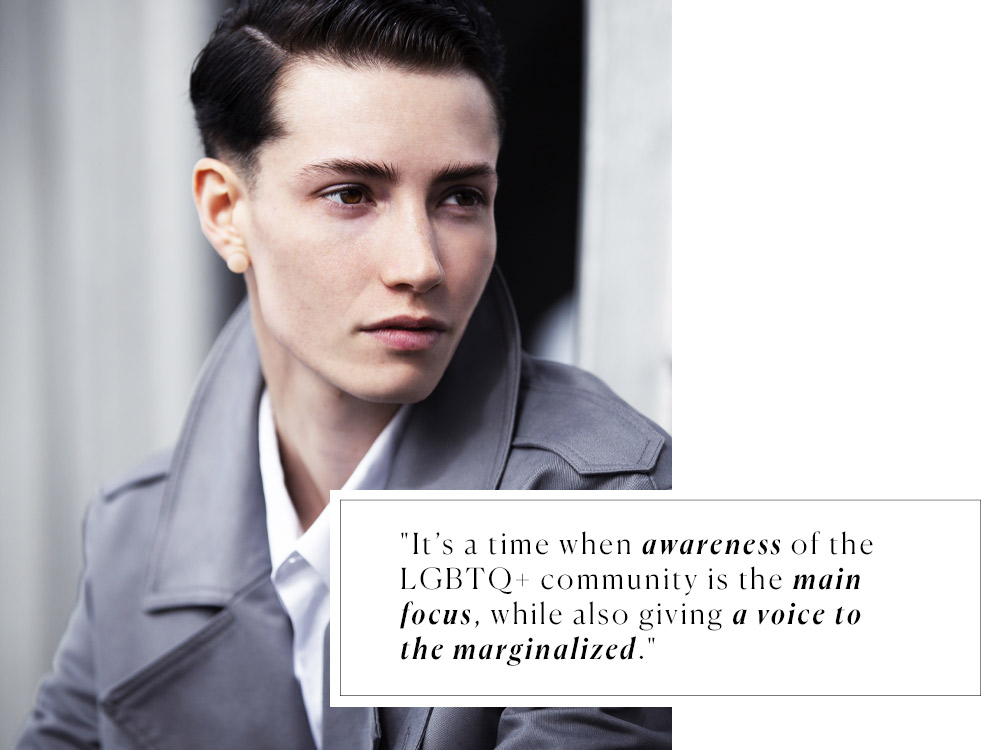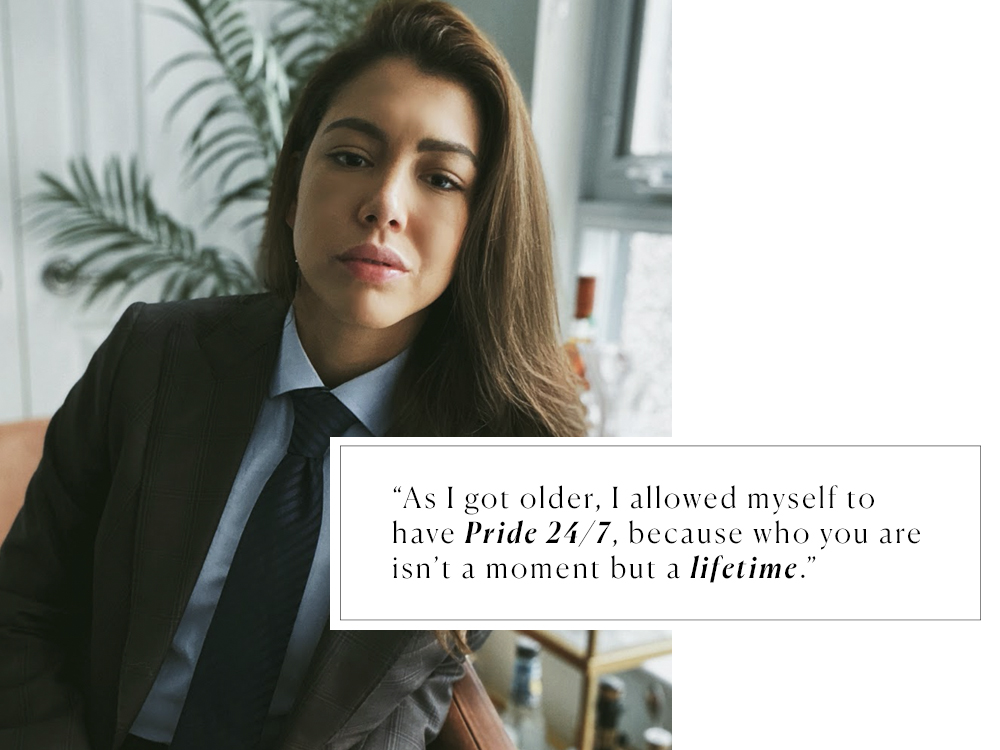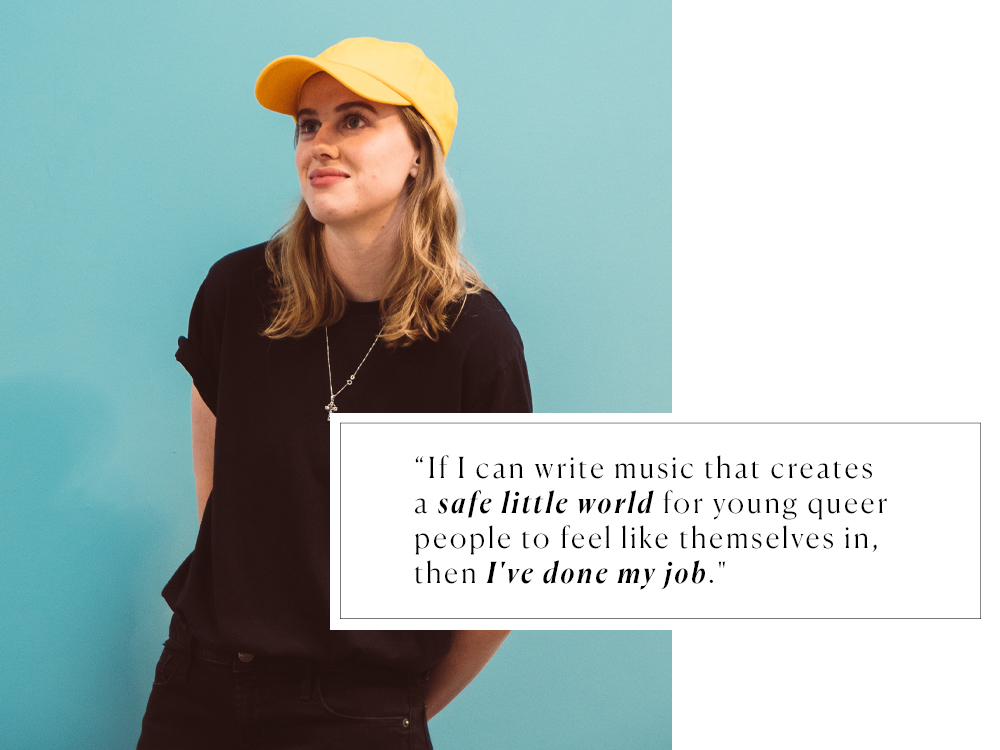Similar to last year, Pride Toronto will again take place virtually due to the ongoing COVID-19 pandemic restrictions, allowing for an alternative celebration to occur. Despite these obstacles, the festivities will continue to honour the adversity overcome by the LGBTQ+ community, while also highlighting their ongoing fight for tolerance and acceptance. In continuation of our Pride series, we spoke with Canadian LGBTQ+ creators including Krow Kian, Natasha Espinoza, and Emma Beckett about how they advocate for greater representation and equality while exemplifying queer excellence.
Krow Kian, Model

Photography by Natalie Tusznio.
“Pride month to me is a time where people from all over the world come together to celebrate the right to love and the right to live. It’s a time when awareness of the LGBTQ+ community is the main focus, while also giving a voice to the marginalized. I like to think of it as a time to honour how far we’ve come, to be able to openly be who we are, and reflecting on how much of a struggle it’s been to get here. For some people it’s a party that comes around in the form of a parade. For others, it’s a time to remember loved ones who weren’t so lucky to be accepted for who they were. These days, there is overwhelming support from within and outside of the LGBTQ+ community, but there are still countries that consider being LGBTQ+ a crime. Hopefully by giving people like us a voice, it can help improve acceptance, even if it’s simply one person at a time.
As a transgender male model and through my documentary Krow’s TRANSformation, I’m in the fairly unique position to help bring more visibility and awareness about the LGBTQ+ community and especially trans men. I can hopefully help be part of understanding and normalizing it. I am continuously doing interviews, and lately, with the pandemic slowing things down, I am working on a special project with my mom to help people better understand transgender lives. Through magazines and fashion shows, I hope to inspire people who are afraid to be true to themselves. At the end of the day we are all human beings who laugh, cry and bleed the same no matter what race, gender, sexuality, or religion we are.”
Natasha Espinoza, Custom Suit Clothier

“Pride to me is so much more than a month of celebration, but to have a internationally-recognized month of honouring and embracing who you are is so important. When I was younger and first coming out, Pride month felt like the only time of year where I could fully express who I wanted to be. As I got older, I allowed myself to have Pride 24/7, because who you are isn’t a moment, but a lifetime. For young people who are coming into their own, some aren’t lucky enough to have family and friends accept them, so to have strangers tell them how much they love who they are is life-changing. Pride is a reminder that we are all worthy of acceptance and respect as human beings.
I am lucky enough to have a social platform and career where I can be open about my sexuality. Working in a predominantly cis-male industry, I do make it a point to highlight the queer community. Most men can confidently go into stores and ask for a suit, whereas so many others have no idea this also exists for them. It’s important to create a safe space for those who may feel misunderstood asking for a suit and like they couldn’t have one because of who they are. Custom suits mean so much more to the community, it’s part of our journey on how we want to express ourselves, that missing piece. I think the best way to honour both yourself and our beautiful community is by simply being your most authentic self, sometimes that can start with getting a suit you were afraid to have before and is now made just for you!”
Emma Beckett, Musician

“I think that I am definitely guilty of forgetting about the actual meaning behind Pride. I think when we have the excitement of the parade, it’s easy to lose the meaning in all the festivities. So these last two years, while I’ve missed the in-person events of course, it’s given me such a good opportunity to look back at the history of Pride—where it started and the work that still has to happen. I also have acknowledged the privilege I have as a white queer person, and using it to lift up the voices of black and trans queer people who have lead our communities since the origins of the Pride movement.
This is probably the first year where during Pride month I am actually proud to call myself a lesbian; after being scared of that word for years. If I can live in that identity with dignity, then I can create music and write songs that are more honest to that. It may seem redundant to keep saying that representation matters, but it’s so important to me. Little baby lesbians deserve to have more music about girls loving other girls, and as a musician, I have the power to contribute to that. If I can write music that creates a safe little world for young queer people to feel like themselves in, then I’ve done my job.”
Here are resources and organizations supporting the LGBTQ+ community:
- Rainbow Railroad
- Casey House
- Egale Canada
- LGBTQ Freedom Fund
- Rainbow Refugee Committee (RRC)
- Project 10
- Gris Montreal
- Martha P. Johnson Institute
- Will Munro Fund for Queer and Trans People Living with Cancer
- TGI Justice
- Black Visions Collective
- A Loving Spoonful
- Out In Schools
- Center For Black Equity
- National Black Justice Collective
- Trans Women of Color Collective
- Transgender District
- Glad Day Lit
- Trans Justice Funding Project
- The 519
- House Lives Matter
- Hetrick-Martin Institute
- Black Women in Motion
- Black Youth Helpline
- Black Legal Action Centre
- The Flamingo Market
- Queer Songbook Orchestra
- Pflag Canada
- Immigration Equality

